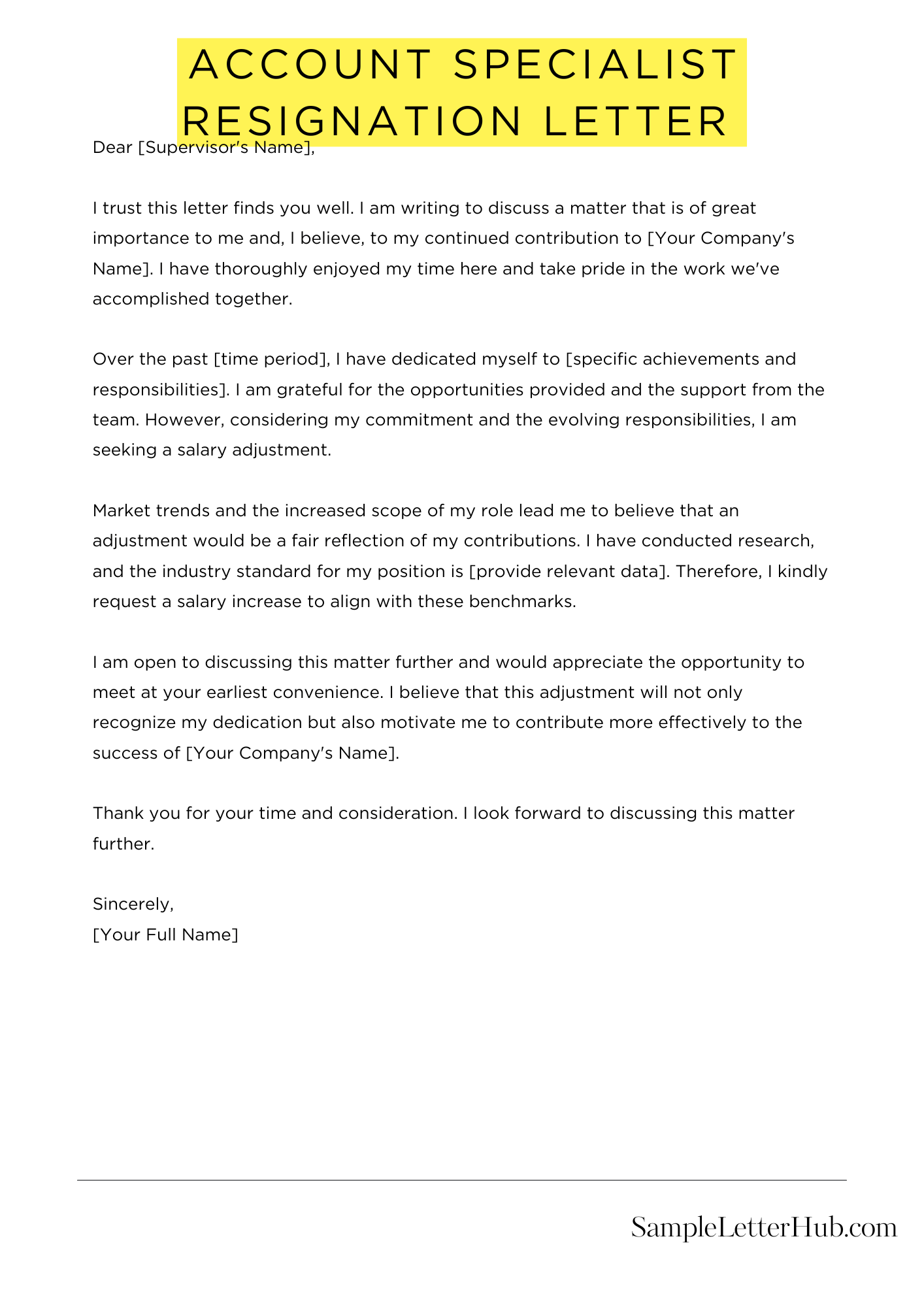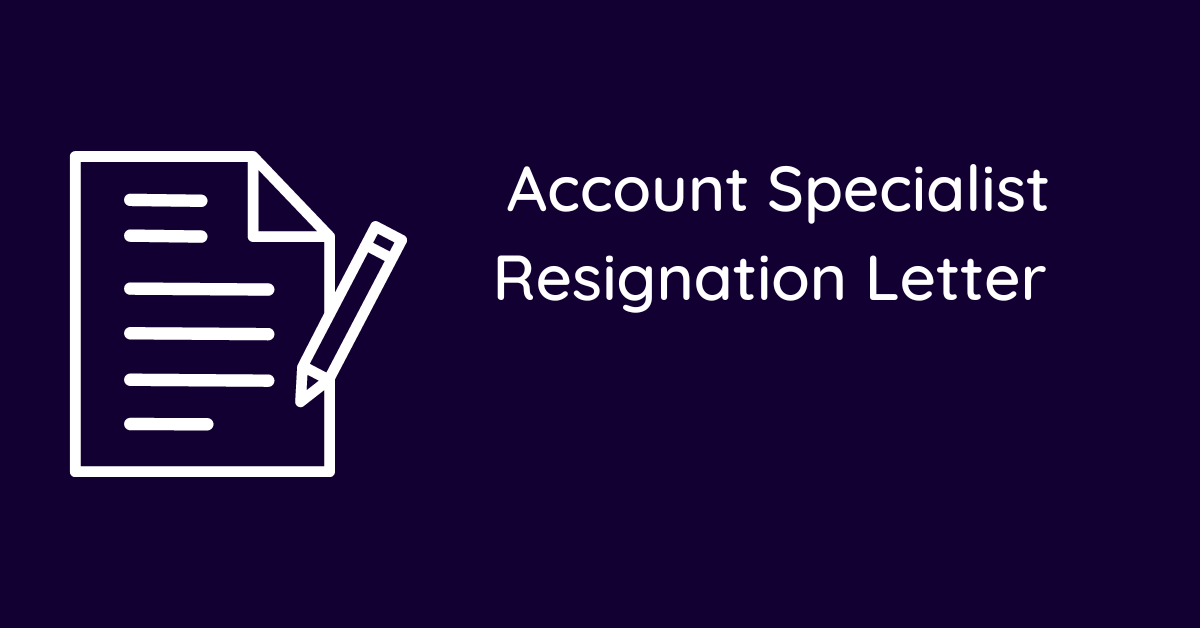When it comes to leaving a job, one of the most important things you can do is to write a clear and professional resignation letter. This letter should explain your decision to leave, and it should be polite and humble in tone. In this blog post, we’ll share an example of an account specialist resignation letter that you can use as a template.
A well-written resignation letter can help you leave a positive impression on your employer, and it can also make the transition to your new job smoother. When writing your letter, be sure to be clear and concise. You should also be polite and respectful, even if you’re not happy with your current job.
We’ve included a template/example account specialist resignation letter below that you can use as a starting point. You can customize this letter to fit your own situation, and you can add or remove any information that you don’t think is necessary.
Account Specialist Resignation Letter
Dear [Manager’s Name],
Please accept this letter as formal notification that I will be resigning from my position as Account Specialist at [Company Name], effective [Last Date of Employment].
During my time at [Company Name], I have gained valuable experience and knowledge that I will cherish. I am grateful for the opportunities I have been given and the support I have received from my colleagues and superiors.
I wish you and [Company Name] all the best in the future.
Sincerely,
[Your Signature]
Short Account Specialist Resignation Letter Sample
Please accept this letter as formal notification that I am resigning from my position as Account Specialist at [Company Name]. My last day of employment will be [Your Last Day]. Thank you for the opportunity to grow and learn during my time here. I wish you and the company continued success. I am happy to assist in the transition process to ensure a smooth handover of my responsibilities.
I wish you all the best with your account specialist resignation letter.
When it’s time to say farewell, expressing your gratitude and best wishes can make the transition smoother:

How to Write an Account Specialist Resignation Letter
1. Craft a Clear and Concise Opening
Begin your resignation letter with a formal salutation, followed by a direct statement of your intent to resign from your position as an Account Specialist. State your last date of employment and express your gratitude for the opportunity to work at the company.
2. Express Appreciation and Highlight Accomplishments
Take the time to express your sincere appreciation for the support and guidance you have received during your tenure. Briefly highlight some of your key accomplishments and the impact you have made in your role. This shows that you value the experience and relationships you have built.
3. State Your Reasons (Optional)
While it is not always necessary to provide specific reasons for your resignation, you may choose to do so if you feel comfortable. Keep your reasons brief and professional, focusing on positive aspects such as growth opportunities or new challenges.
4. Offer to Assist with the Transition
Demonstrate your commitment to a smooth transition by offering to assist in any way possible. This could include training your replacement, providing documentation, or completing any outstanding projects.
5. End with a Professional Closing
Conclude your resignation letter with a polite and professional closing, such as “Sincerely” or “Best regards.” Include your full name and signature below.
Account Specialist Resignation Letter: 6 FAQs Answered
Resigning from a position can be a daunting task, especially when it comes to crafting a professional and effective resignation letter. Here are six frequently asked questions and answers to help you navigate the complexities of writing an Account Specialist resignation letter:
1. What should I include in my resignation letter?
Your resignation letter should include the following key elements:
- A clear statement of your intent to resign from your position as an Account Specialist.
- Your last date of employment.
- A brief expression of gratitude for the opportunity to work at the company.
- An offer to assist with the transition during your notice period.
2. How should I format my resignation letter?
Your resignation letter should be formatted professionally, using a standard business letter format. This includes using a clear font, single spacing, and left-aligned text. Keep your letter concise and to the point, typically around 3-4 paragraphs.
3. What tone should I use in my resignation letter?
The tone of your resignation letter should be professional, respectful, and appreciative. Avoid being overly emotional or negative. Instead, focus on expressing your gratitude for the opportunity to work at the company and your commitment to a smooth transition during your notice period.
4. Should I give a reason for my resignation?
It is not necessary to provide a detailed explanation for your resignation in your letter. However, you may choose to briefly state your reason for leaving if you feel comfortable doing so. Keep it brief and professional, and avoid making negative comments about the company or your colleagues.
5. How much notice should I give?
The standard notice period for an Account Specialist is two weeks. However, it is advisable to check your employment contract or company policy to confirm the specific notice period required. Providing ample notice will allow your employer time to find a suitable replacement and ensure a smooth transition.
6. What if I have any outstanding projects or responsibilities?
In your resignation letter, offer to assist with the transition during your notice period. This may involve providing training to your replacement, completing any outstanding projects, or assisting with the handover of your responsibilities. By being proactive and helpful, you can leave a positive impression on your employer and colleagues.
Before making the decision to resign from your job, it’s essential to consider the legal aspects:
Understanding your emotions after quitting your job is important. Explore why you might be feeling sad:
Related
- Resignation letter sample
- Forced resignation letter
- Resignation letter due to going abroad
- Resignation letter due to marriage
- Resignation letter due to other opportunity
- Resignation letter due to mistake

